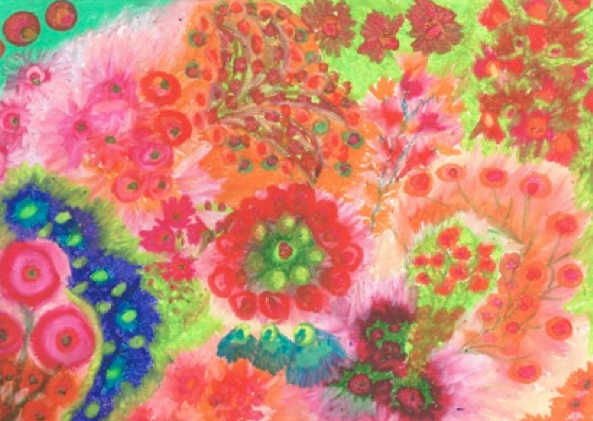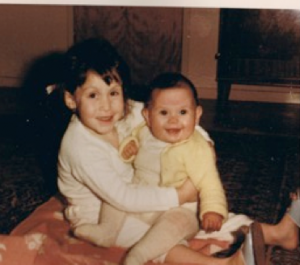So this is very difficult. I’m going to share some of my thoughts with you, but because I’m not ready to at this point, not share others. What happened is too big to be ignored in what I write, but also too big to share, beyond the superficial.
(The drawing is by Dina)
Less than a year ago, my sister Dina was diagnosed with incurable cancer. Two weeks ago she died, after a long struggle. She was 54. Dina lived in Holland, but when she was told there would be no more treatment, she asked to come to Israel. This had been her plan for a long time, and the illness, rather than killing her dream, made it all the more urgent. With a lot of help, and many miracles on the way, Dina arrived in Israel five months ago. It was not how she had planned it, but in her heart, being in Israel seemed to be what she wanted the most. It was a terrible time and it was a fantastic time. We spent a lot of it together. For that, I’m endlessly grateful.
The Jewish custom, after the funeral of a loved one, is to sit shiva. Shiva means seven, for the seven days of mourning Jews observe after the death of a parent, sibling, child or spouse. Like always in traditional Judaism, there are rules how to observe shiva, but in short, the mourners sit together in the home of the departed, or one of their homes, for a week, and receive visitors. The mourners are not supposed to do anything, and not to leave the house. Food is brought and served by friends and family. No cleaning, no laundry, and no work.
From last Monday night, till the following Monday morning, my parents, my brother-in-law and I sat in our living-room, from seven in the morning till ten at night, and talked about Dina, about what happened, about old memories and a lot of things that had nothing to do with Dina’s death. Family, friends, neighbours, colleagues, members of our congregation, the Dutch Israeli colony, the Swedish Israeli colony, and one guy we barely knew, dropped in to sit with us. Some stayed twenty minutes, some stayed many hours. Many came with food, cakes, drinks. Some had words of wisdom, some had a lot of questions. Some took refuge in the safe haven of platitudes. Others just sat, at loss what to say. Close friends dropped in for a short time, went home, came back, made sure we knew they were around, in every sense. There was a lot of hugging and kissing. As is the case everywhere, much of the conversation boils down to pleasantries, with the occasional heartwrenching, upsetting or profound moment. Far from everyone who came knew Dina. We left some photos on the table, baby pictures, vacations, marriage, family visits. Our visitors looked through the photos, connecting to different points in our lives. We talked a lot about other shiva-houses. It’s one of the things we are proud off, we know how to mourn. We, who grow up knowing that at some point, we will be the one who is sitting shiva, feel sorry for those who will never experience the consolation of the shiva house. In Israel, the labor-laws automatically give you a week of from work to sit shiva after a loved one. In other countries, where it may not be so simple to take an unplanned week off from work, Jews will sit shiva in the evening, or for a day or two, but the custom of shiva is still widely observed. A shiva house is not always easy. Sitting still for so long gets tireing. I found it hard not to be in charge of my kitchen. Talking for hour after hour isn’t easy either, even for a chatter-box like me. You want to say things of meaning, and hear words of comfort. That’s not the case, all the time.
During the week, I had conversations about choosing schools for the children, about a book I read and summer-camp a long time ago. The house was packed with lots and lots of people, speaking any number of languages. I loved that many of my friends went over and sat with my parents, who some of them don’t really know. It is, of course okay to cry, but also to laugh or talk of things other than death and illness. The shiva week is for the mourners, not for the dead. When someone dies, the near and dear have to recalibrate their lives around the new situation. I’ve always been one of two sisters. So now I’m the same, but different. And that is how I understand what a shiva week is good for. The friends who come to see you, help you put yourself together again. They remind you of the other relationships in your life, they reflect the life you have built for yourself, the support-systems you have in place. You see your loss, but you also see what you have. For that, too, I’m truly grateful.
Noomi Stahl


